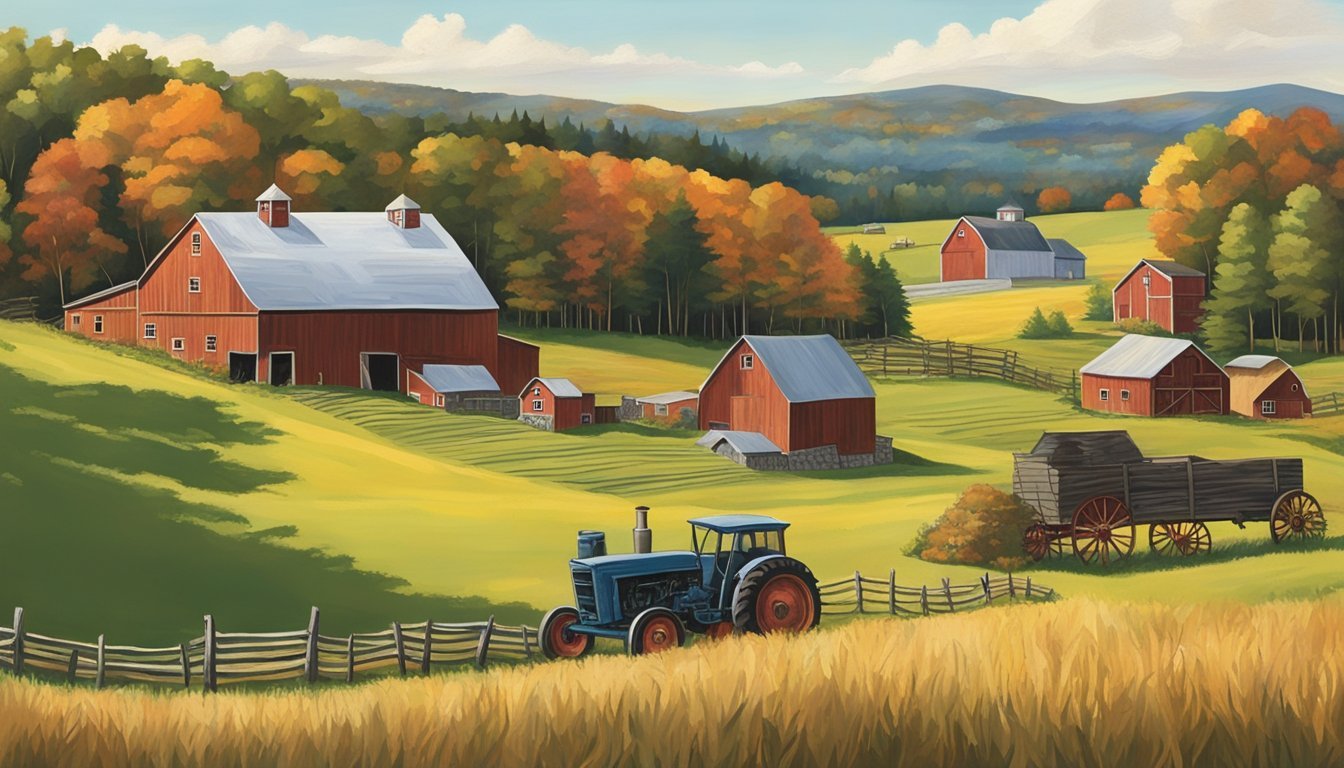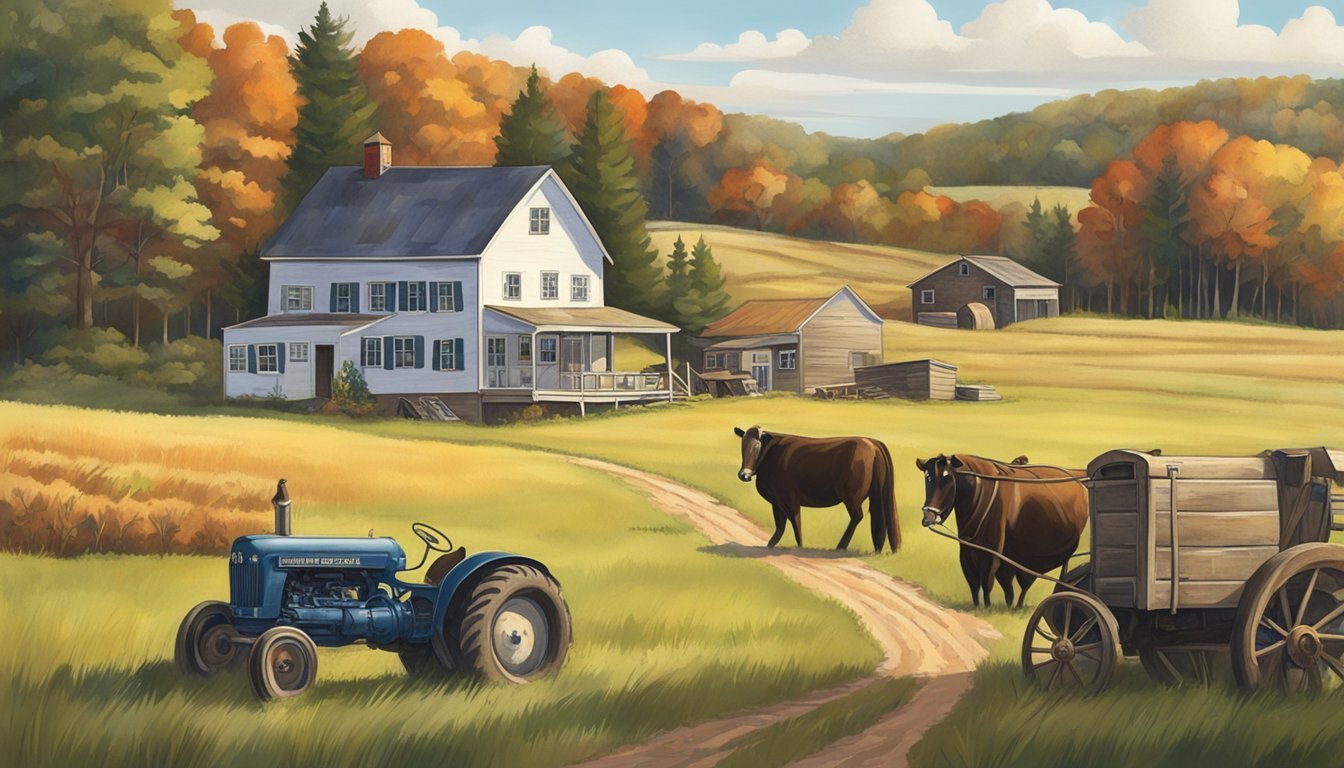Historical Farms and Agricultural Museums in Maine
A Guide to Agrarian Heritage
Maine's rich agricultural heritage, marked by a longstanding tradition of farming and rural community life, has shaped much of its cultural landscape. Historical farms and agricultural museums scattered across the state offer a window into the past, preserving and interpreting the daily lives, practices, and innovations of Maine's farming communities from the 19th to mid-20th centuries. These institutions serve as custodians of history, safeguarding artifacts, and stories that have defined generations of Mainers' relationship with the land.
At the forefront of preserving this legacy is the Page Farm & Home Museum, which strives to collect, document, and share knowledge of Maine's historical farms and farming communities, particularly those operative between 1865 and 1940. The museum provides an educational experience for the public that extends beyond traditional exhibits by offering a glimpse into the practical aspects of farm and home life during this period.
Contributing to the narrative of Maine's agricultural past, the Matthews Museum of Maine Heritage and similar venues reveal the evolution of rural life and technology. They focus on the impact of farming in the growth of the state and nurtured the spirit of community that is central to Maine's identity. It's through these cultural institutions that the state's agricultural history is celebrated and kept alive for future generations to admire and learn from.
Historical Context and Importance
Maine's agricultural heritage is one deeply rooted in both Native American practices and the subsequent impact of European settlers. The state's farmland, at its peak between 1870 and World War I, spread over 6.3 million acres with around 60,000 farms The Transformation of Farming in Maine, 1940-1985. This rich period in history marked an era where family farms dotted the landscape, primarily for sustenance and occasionally for surplus selling, establishing a diverse agrarian economy.
By the early twentieth century, changes in industry and the economy saw transformations in the extent and nature of Maine's farming. The state's rural society undertook a fundamental shift, adapting past traditions to newer agricultural methods and market demands. The Maine Historical Society and various heritage museums work to preserve the physical remnants of these times, such as the Page Farm and Home Museum which houses historical buildings like an 1833 post-and-beam barn, representing the last original agricultural edifice on the University of Maine campus Page Farm and Home Museum.
Furthermore, the historical association with Native American agricultural techniques underscores a different layer of importance – the integration of indigenous knowledge and sustainable practices before European settlement. Museums in the state not only depict the homes and civic buildings of early settlers but also hint at the pre-settlement era History and Heritage Museums.
In understanding these aspects, one appreciates the transformation of Maine's agricultural identity from its indigenous roots through the march of time to the technology-influenced practices of today, all while reinforcing the state's commitment to preserving its valuable past.
Maine Agricultural Museums Overview
Maine offers a rich tapestry of agricultural heritage, showcased through a diverse array of museums. These institutions preserve the state's farming history and provide educational experiences to the public.
Aroostook County Museums
Southern Aroostook Agricultural Museum, located in Littleton, concentrates on the rural life of Aroostook County, which is Maine's largest and northernmost county. With multiple buildings, visitors can explore thousands of items that illustrate the daily life and work in the area.
In Presque Isle and Caribou, farming and community history is highlighted, showcasing Aroostook's role in potato farming.
Museums in Southern Maine
Washburn-Norlands Living History Center in Livermore provides an interactive experience with a focus on agricultural life in the 19th century.
Along the St. John River in Fort Kent, farming communities’ contributions to regional heritage are displayed. The living history aspect is particularly strong here, inviting visitors into a reconstruction of rural life.
Specialized Museums and Historical Homes
Sarah Orne Jewett's house in South Berwick offers insights into domestic life in a farming community.
The Museums of Old York preserve several historic buildings and a rich collection of artifacts tied to York's agricultural past.
Living History Experiences in Maine
Norlands, as a hands-on museum, lets visitors participate in farming and domestic activities typical of a 19th-century family farm.
Fort Kent explores rural lifestyles along the banks of the St. John River, bringing history to life.
Collections and Exhibits
The Maine Jewish Museum and the Lincoln County Historical Association Museums possess collections that, among other facets of local history, touch upon the agricultural practices and innovations in Maine.
From museum galleries to interactive exhibits, these collections provide in-depth knowledge and context to Maine's agriculture.
Maine Historical Society and Partnerships
The Maine Historical Society fosters collaborations with entities like the Association for Living History, Farm and Agricultural Museums (ALHFAM).
Through partnerships with various organizations, the society helps to preserve and promote Maine's rural and farming history.
Agricultural Heritage of Maine
Known for products like potatoes and blueberries, and highlighting past industries like canning, Maine's museums provide a comprehensive portrayal of its agricultural roots.
Family farms and the transformative impact of agriculture on the state’s development are key themes within these institutions.
The various museums and historic sites across Maine work together to ensure the state’s agricultural history is not just preserved, but also made accessible and engaging for generations to come. Each museum contributes its own unique narrative and collection to the broader story of farming and rural life in Maine.
Educational Programs and Events
Maine's historical farms and agricultural museums offer a diverse range of educational experiences that cater to different age groups and interests. They provide opportunities for hands-on learning, cultural insights, and a deeper understanding of the state's rural heritage.
Workshops and Demonstrations
Historical farms in Maine, such as the Page Farm & Home Museum, regularly conduct workshops that cover various aspects of rural living. Visitors can engage in activities like spinning, weaving, and demonstrations of blacksmithing. These workshops often focus on traditional skills, underscoring the importance of craftsmanship in rural communities.
School and Group Tours
Schools and groups are welcomed for immersive educational tours that reveal the intricacies of past lifestyles. The Page Farm & Home Museum invites school children to explore a one-room schoolhouse and a general store, giving them a glimpse into the educational and economic facets of early 20th-century Maine. Guided tours led by knowledgeable staff ensure that visitors gain valuable insights into the state's agricultural history.
Cultural Celebrations and Seasonal Events
Farms and museums host events and festivals that celebrate Maine's rich cultural heritage. Seasonal events allow families to participate in activities that reflect the changing agricultural calendar, reinforcing the bond between community and the rhythms of rural life. These gatherings often include traditional music, local food, and crafts, creating a vibrant atmosphere of learning and enjoyment.
Research and Archival Resources
For those interested in delving deeper into Maine’s agricultural past, resources such as libraries, archives, and maps are invaluable. Institutions like the Maine Historical Society provide access to an array of materials that scholars, educators, and the general public can use for research and exploration. These resources offer a wellspring of ideas for understanding historical perspectives and the progression of agricultural practices.
Visiting Maine's Historical Farms and Museums
Maine offers a wealth of historical farms and museums that invite tourists to step back in time and experience the state's rich agricultural heritage. These attractions provide family-friendly activities, guided tours, and special programs designed to educate and entertain.
Planning Your Visit
When organizing a trip to Maine's historical farms and museums, it is advisable to check the availability of guided tours and confirm operation hours. For instance, the Page Farm and Home Museum operates Wednesday to Saturday from 10 AM to 3 PM, but private tours can be scheduled outside these hours by appointment. It's essential to include a diversity of experiences in your agenda to embrace the full scope of Maine's agrarian past and present.
Operating Hours: Wed-Sat, 10 AM - 3 PM
Private Tours: Available by appointment
Recommended Duration: At least 2 hours per museum
Accessibility and Accommodations
The facilities at historical sites strive to be inclusive, offering accessible accommodations for visitors with varied needs. Details regarding accessibility should be confirmed in advance to ensure a comfortable and enjoyable visit. Many sites provide on-site services to assist visitors, including parking, restrooms, and resting areas, which are typically noted on the institution's website or through a quick phone inquiry.
Accessibility: Check each museum's website or call for information
On-Site Services: Available at most locations
Gift Shops and Local Products
Exploring Maine's historical farms and museums often concludes with a stop at the venue's gift shop, where visitors can purchase local products and souvenirs. These shops showcase items ranging from handcrafted goods to historical books, offering guests a tangible memory of their visit. For example, farms like Pineland Farms not only engage visitors in daily farming activities but also provide an opportunity to shop for locally-produced goods, representing the essence of Maine's agricultural tradition.
Local Products: Handcrafted goods, foods, historical literature
Souvenirs: Unique to each location
Embracing Maine's agricultural history through its museums and farms provides an enriching experience for the entire family, granting an insight into the state's traditions and community spirit.
Preservation and Future Outlook
Preservation and historical integrity are paramount when considering the future of Maine's agricultural past. The commitment to maintain and showcase this rich agricultural heritage ensures that future generations can appreciate the traditions and innovations that shaped the state.
Conservation Efforts
In Maine, the conservation of historic farms plays a crucial role in the state's dedication to sustainable preservation. These efforts are multifaceted, addressing both the tangible architecture and intangible heritage that characterize the rural landscape. Projects focus on the restoration of farm structures and the conservation of agricultural lands that are vital for future sustainability.
Community Involvement and Support
The success of preservation initiatives often hinges on community involvement and support. Numerous organizations throughout Maine, including the Maine Historic Preservation Commission and local museums like the Matthews Museum of Maine Heritage, depend on volunteers and donations to carry out their missions. Engagement from community members not only provides necessary funds and labor but also fosters a heritage of shared responsibility and pride.
Conclusion
Maine's landscape is rich with the legacy of its farming past. Museums dedicated to agriculture, such as the Page Farm & Home Museum, stand as testaments to the state's commitment to preserving its heritage. These institutions not only showcase historical artifacts but also serve as educational resources, offering a window into the farming techniques and community life from 1865 to 1940.
Tourism and education blend seamlessly at these sites. Visitors and locals alike delve into Maine's agrarian history, which contributes to a deeper understanding of the state's culture and community spirit. Schools often leverage these museums to enrich students' knowledge of local history and to instill a sense of pride in Maine's past.
Looking to the future, the preservation and promotion of such museums are crucial in sustaining Maine's cultural identity. The agricultural museums not only attract tourists but also stimulate local economies, creating a symbiotic relationship between heritage and progress.
In the context of community involvement, these museums often rely on the support of volunteers and local historical societies, reinforcing a sense of shared ownership and responsibility towards Maine's agricultural legacy.
By embracing its history, Maine continues to honor the hard work and innovation that shaped its land and people. This approach ensures that the principles and lessons of the past remain an integral part of the state's ever-evolving story.






